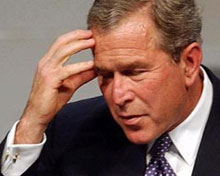|
Bush Says God Selected Him For Presidency: Book
 |
|
“I
feel like God wants me to run for President,” Bush
|
LONDON,
November 4 (IslamOnline.net & News Agencies) – A new book
quoting U.S. President George W. Bush as saying that God had chosen
him to lead the nation was released, raising expectations to stir up
controversy at a time Washington is keen to portray its “war on
terror” as non-religious.
The
Faith of George W. Bush, written by Christian author Stephen
Mansfield, details numerous incidents where Bush's faith has been
shown to be at the centre of his political thinking, The Observer
reported Sunday, November 2.
In
the lead-up to announcing his candidacy for the presidency, Bush told
a Texan evangelist that he had had a premonition of some form of
national disaster happening.
“I
feel like God wants me to run for President. I can't explain it, but I
sense my country is going to need me. Something is going to happen...
I know it won't be easy on me or my family, but God wants me to do
it,” Bush told James Robinson, according to the British daily.
In
another incident, Mansfield recounts how, on Palm Sunday last year,
Bush was flying back from El Salvador aboard the Presidential jet Air
Force One and seemed to be destined to miss church.
But
some officials, knowing that Bush hated to miss a service, suggested
they worship in the air. Bush agreed, and soon 40 officials were
crammed into the plane's conference room.
The
service was led by National Security Adviser Condoleezza Rice, while
the lesson was read by close Bush aide Karen Hughes, according to the
book, quoted by the paper.
Praying
With Iraq Casualty
Among
Mansfield's revelations is his insistence that Bush and Tony Blair
have prayed together at a private meeting at Camp David. Blair has
previously denied this.
Mansfield,
however, says that, while there were no witnesses, aides were left in
little doubt as to what had happened.
He
told The Observer: “There is no question they have shared
scripture and prayed together”.
Bush
and Blair were staunch supporters making the case for attacking Iraq,
with the former always criticized
for putting a religious spin on his justifications to invade the Arab
country.
The
author also proves anecdotes about Bush that had previously been
dismissed as false.
Mansfield
tracked down witnesses and a hospital chaplain who said that Bush had
prayed with a young soldier who had lost a hand in Iraq, ending by
kissing him on the forehead and telling him he loved him.
Last
week, Bush stood before a cheering crowd at a Dallas Christian youth
centre, and told them about being 'born again' as a Christian.
“If
you change their heart, then they change their behavior. I know,” he
said, referring to his own conversion, which led to him giving up
drinking.
“King
of Kings” and “Lord of Lords”, proclaimed the two banners behind
him, in a move the writer said shows the symbolism of how fervent
Christianity has become deeply entwined with the most powerful man on
the planet could not have been stronger.
As
few U.S. Presidents have been as openly religious as Bush, the book is
to give ammunition to critics who say that Bush's administration is
heavily influenced by extremist Christians.
Bush
is already under fire for allowing the appointment of General William
Boykin to head the hunt for Osama bin Laden, Washington blamed for the
September 11 attacks.
Boykin,
who speaks at evangelical Christian meetings, once said the war on
terror was a fight against Satan, and said
the Muslims’ God was not a real god but just an “idol”.
Bush
has also been accused of a 'creeping Christianisation' of federal
government programmers, according to the Observer.
In
September, the government made more than $60 billion available for
religious charitable groups.
Critics
say the groups will be able to use the cash to promote their religion.
One group that benefited from previous grants was an Iowa prison
project that entitled inmates to televisions, private bathrooms and
computers - in return for Christian counseling.
In
April, Bush came under fire after calls for prayers for a U.S. victory
in the Iraq war that had been earlier branded
by the World
Council of Churches (WCC) as immoral and unwise.
Pope
John Paul II also censured him, asserting that the American president assumed
a "grave responsibility before God" in
deciding that diplomacy to avoid conflict with Iraq had been
exhausted.
|